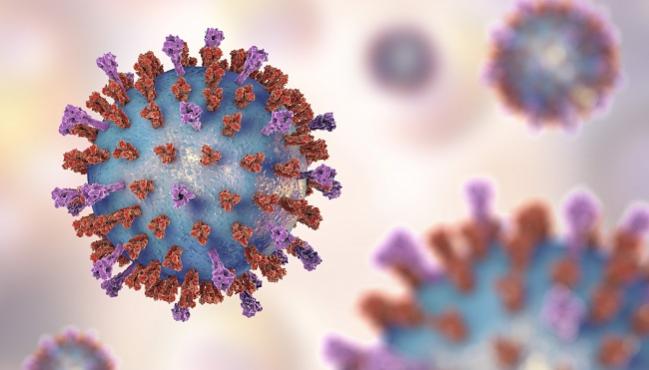Respiratory Syncytial Virus Linked With Cardiovascular Complications
RSV affects nearly all children, but reinfections in adulthood can have important repercussions for those with and without preexisting CVD, new research shows.

Not unlike influenza, the respiratory syncytial virus (RSV) appears to have detrimental effects on the heart including an increased risk of cardiovascular complications among individuals with and without preexisting cardiovascular disease, according to a new review.
For those without underlying heart disease, approximately one in five adults can develop cardiovascular complications, including congestive heart failure and MI, following hospitalization for confirmed RSV infection, say experts.
“It’s a very, very common virus and little kids can become critically ill from it,” senior author Helen Keipp Talbot, MD (Vanderbilt University Medical Center, Nashville, TN), told TCTMD. “It’s one of the leading causes of bronchiolitis in children. For some reason, we never develop full immunity. We’re at risk of developing it over and over again throughout our lifetime, but usually as an adult it’s quite minor. It’s like having a cold or allergies. So we go from this period when you’re a child of being critically ill to where it’s just like a common cold. As you continue to age, though, RSV can cause worse illness and hospitalization.”
In their review, which is published April 2, 2018, in the Journal of the American College of Cardiology, Talbot and colleagues point out that most of the research to date has focused on influenza and the associated risks of cardiovascular events, but other respiratory tract illnesses, including RSV, have also been associated with cardiac complications.
“It’s a lot like influenza,” said Talbot. “We’re just beginning to learn and understand it.”
Prolonged or Recurrent Inflammatory Response
Although RSV is increasingly common in young people, affecting nearly all children in the first 2 years of life, symptomatic reinfections are common, particularly in individuals with underlying cardiopulmonary disease, said Talbot.
In their review, the researchers focused on two patient populations: individuals with and without preexisting cardiovascular disease. For those with underlying cardiopulmonary disease, multiple studies suggest these individuals are at a higher risk for symptomatic RSV infection, with several showing high rates of preexisting cardiac disease among those hospitalized with RSV.
For example, in one Canadian study of 86 adults with laboratory-confirmed RSV, 52.0% had underlying cardiac or cardiovascular disease. In a French series of 53 adults with RSV, 45.0% had a history of chronic heart disease, which was similar to the rate observed among patients with influenza. In a larger series of 145 adults 65 years and older hospitalized with laboratory-confirmed RSV, 63.0% had underlying cardiac or cardiovascular disease.
If you get sick from the virus, it can tip the heart disease over. Helen Keipp Talbot
To TCTMD, Talbot also noted that cardiovascular complications can occur after RSV, even among those without preexisting heart disease. In six published papers to date, cardiovascular complications occurred in 13.0% to 22.0% of those who develop RSV. In the largest study of 607 adults admitted to hospital with an acute respiratory infection (and who later had RSV confirmed), 14.3% had an exacerbation of congestive heart failure, atrial fibrillation, acute coronary event, or acute cerebrovascular event.
“If you get sick from the virus, it can tip the heart disease over,” said Talbot. “You may have trouble breathing, and this might cause your heart to work harder, and this might lead to an exacerbation of heart failure or heart attack.”
Like other viral and bacterial pathogens, RSV is thought to be associated with the development of atherosclerosis and acute coronary events via a prolonged or recurrent inflammatory response or plaque destabilization. With acute coronary syndrome, RSV might lead to a “hypercoagulable state,” which results in a “risk of thrombosis from higher levels of fibrinogen and thrombin and increased platelet binding,” according to Talbot and colleagues.
Vaccines in Testing
The researchers point out that preexisting cardiovascular disease might not only be associated with an increased risk of RSV infection, but also higher rates of healthcare utilization and worse outcomes for RSV-related illness. At present, RSV is difficult to differentiate from flu in adults based on symptoms alone, but a precise diagnosis might be more important in the future because there are several ongoing preclinical and clinical trials of RSV vaccination.
“We may actually be able to treat them and lessen the inflammatory response, to make it less intense, and decrease the likelihood of a cardiac event,” said Talbot.
In the meantime, she said that if patients are diagnosed with RSV, they can’t yet be treated but they can spread the virus to other patients in the hospital. “So it’s important to think about it and isolate them so we’re not making anybody else in the hospital sick,” she said. “If you’re a hospital worker and you’re sick, even if you think it’s a simple cold, it might cause more severe disease in your patients. Always, always, if you have a cold, [wear a] mask and try to protect your patients.”
Michael O’Riordan is the Managing Editor for TCTMD. He completed his undergraduate degrees at Queen’s University in Kingston, ON, and…
Read Full BioSources
Ivey KS, Edwards KM, Talbot HK. Respiratory syncytial virus and associations with cardiovascular disease in adults. J Am Coll Cardiol 2018;Epub ahead of print.
Disclosures
- Talbot has received research funding from Sanofi Pasteur, MedImmune, and Gilead; and served as a safety advisor for Sequirius and VaxInnate.


Comments